Are you ready to mark the first day of your go-vegan lifestyle? If so, we’re giving you that opportunity on a gold platter by presenting you with a detailed 30 day vegan challenge. To be clear, though, no pressure is involved here.
Whether you call it quits after the month is over or become a vegan for life, that’s ultimately your call – no judgments made. However, take it upon yourself to at least continue the challenge to its end. In all cases, you’ll be giving your body some much-needed rest from both meat and dairy, and in the process, you’ll explore new ways of incorporating new habits into your lifestyle!
From cooking delicious yet completely meat, dairy, and egg-free meals and reducing your carbon footprint to revisiting the food you’re letting into your body and feeling more energetic, let’s expand your food palette and give you a try out to a healthy, compassionate life!
What Does It Mean to Be Vegan?
Before we get right to the challenge, let’s get the basics out of the way. For starters, let’s discuss what veganism actually is. In itself, being vegan means a diet that’s free of any animal-based food, and that includes meat, eggs, dairy products, and even honey.
Being vegan was then taken a step further to introduce veganism, which refers to not just food products but also cosmetics, medicine, clothing, furniture, and everything else that could be made of animal derivatives.
As you can see, veganism’s main idea is to express disapproval of animal cruelty, from animal testing and slaughter all the way to even zoos.
Why Go Vegan?
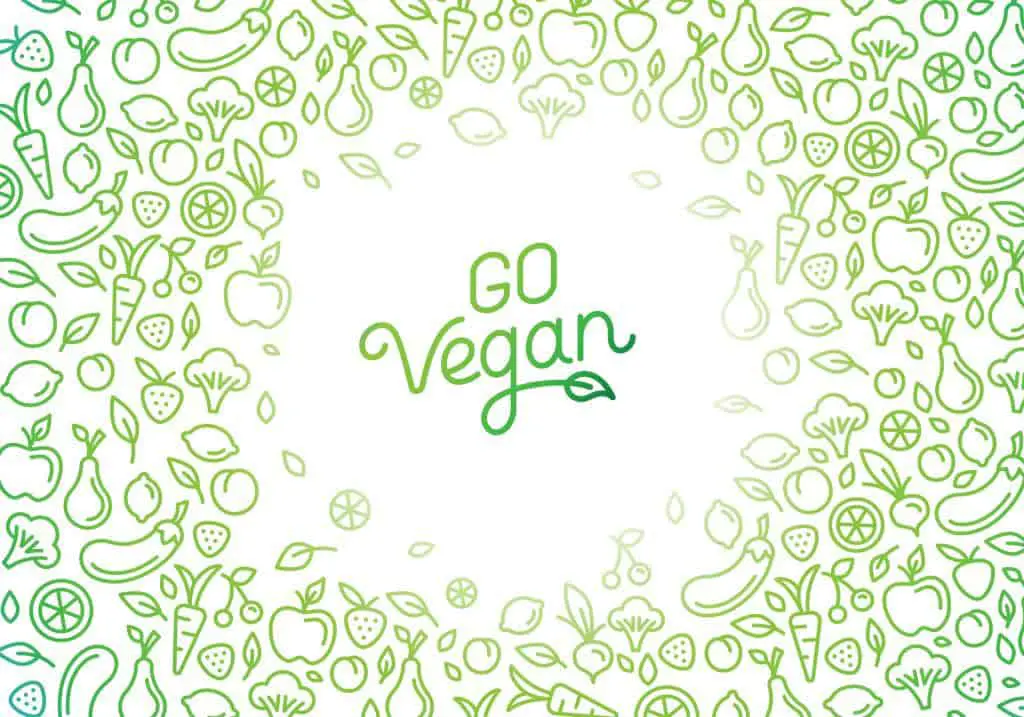
Well, other than the fact that you’re contributing to less animal suffering, a vegan lifestyle also contributes to the betterment of the environment at large. When you exchange meat-based diets with plant-based ones, carbon dioxide emissions are reduced by 1.5 tons per year, per person. Can you imagine how much that supports the climate change issue?
And that’s not all; other than supporting animals and the environment, multiple personal benefits are involved with vegan diets, including:
- Boosting of fitness levels
- Equally delicious (if not tastier) meals
- Eliminating a large set of unhealthy foods, many of which are associated with cancer
- Overall better health due to eating more fruits and vegetables
- Avoiding chronic health ailments by quitting dairy
- Lower blood pressure and cholesterol levels
- Glowing skin
Further Read
Here’s a list of the best vegan documentaries to go deeper into the subject and learn more about veganism.
How Does the Challenge Work?
When it’s time to control your cravings and take charge of your plate, what will be expected of you during the 30 day challenge?
To begin with, we highly encourage you to announce that you’re going for the challenge. Why, you wonder? Because that’ll ensure your commitment, you’ll basically become “forced” to continue. Otherwise, it’s not uncommon for people to get stuck in the never-ending cycle of “I’ll start tomorrow” and “maybe next month”. This small step will do big things!
Then, to actually proceed with the challenge, you’ll need to cut off all animal products and bi-products for the month. To simplify, that includes meat (poultry as well), seafood, honey, eggs, and dairy products. It won’t be one week off and one week on, and you can’t break the habit in the middle of the challenge – you need to eliminate the products for 30 days straight.
What Happens to Your Body When You Go Vegan?
It’s normal to be questioning the changes that may occur to your body when you undergo such a significant change, but we’d like to assure you: as long as you follow a nutrient-rich vegan diet, you’ll only see drastic health improvement.
Many people will also be pleased to hear that weight loss is one of the usual occurrences with going vegan, so if that’s what you’ve been yearning for, you’re about to get it.
And that’s only because you’re cutting on mindless snacking and excess protein calories from meat – with veganism, you’re only giving your body what it needs with fewer temptation options. Plus, plant-based proteins are much lower in calories than meat.
On another note, one of the significant advantages of going vegan is that you’ll develop heightened taste buds. So, you’ll have a much stronger bond with food, and your cravings will be less. If you’ve been struggling with a sweet tooth, that’s about to disappear since cravings are tamed to a large extent.
Last but not least, get ready to welcome an energized version of yourself. That afternoon sleepiness you always felt will go away on its own, and instead, will be replaced by increased energy.
So, do all of those effects happen suddenly? No. They occur in stages, and here’s an overview of those:
The First Couple of Weeks
- An energy boost
- An increase in vitamin, mineral, and fibre levels
These are the visible changes to your body that you’ll be noticing, and they’re associated with the removal of processed meats from your diet. At this phase, you’ll be substituting meat with fruits, nuts, and vegetables – which all fuse your body with the right amounts of mineral, vitamin, and fibre levels it needs.
To sustain that energy level, it’s always a good idea to think ahead about your meals and even snacks; you want to get rid of the habit of eating whatever comes in front of you for the best results. However, it’s important to stress that you should be mindful but not obsessive with your eating habits.
The Following Few Weeks
- Functioning toward a more regular, healthy bowel function
- In some cases, an increase of bloating/loose stool
Don’t be alarmed. It’s normal for your bowel functions to undergo some changes at this point, and that’s due to the increase of fibre in vegan diets from fruits and vegetables.
The side effects are temporary – your body will get used to taking in that level of fibre regularly. But at the beginning, it’ll cause an increase in the bacteria diversity within the colon, but that’s not a bad thing; it’s actually beneficial for your whole colon system.
3-6 Months Later
- Fading acne
- Strengthened heart health and functioning
- Stroke prevention
- Reduced risk of diabetes
As your body gets used to the vegan diet, the increased consumption of fruits and vegetables, and the elimination of processed foods leads acne to start clearing up. However, it’s important to emphasize that you should either ensure that you’re eating sufficient amounts of fortified foods or taking vitamin D supplements to ensure that your vitamin D levels don’t drop.
Also, since well-balanced vegan diets are low in both salt and processed food, your body starts boosting its immune system, and the food prevents heart diseases, reduces the risk of diabetes, and basically eliminates your chances of stroke.
Finally, with vegan diets, you’re not taking in as much iron, calcium, and zinc, so your body resorts to absorbing them from the intestine, which is very healthy. That’s actually enough to prevent deficiencies in most cases, but if that’s not your case, you’ll simply need to take supplements.
6+ Months Later
- Low vitamin B12 stores
- An overall healthier body
When you’re approaching a year on a vegan diet, it’s not uncommon for your vitamin B12 stores to be lower than average, especially if you haven’t been exerting deliberate effort toward incorporating three portions of fortified foods in your diet per day or actively taking supplements.
Yet, overall, by this time, your body will have already gotten used to running on plant-based nutrients, and so you’ll be feeling fully energetic at all times and healthier overall.
What to Eat: The 30 Day Vegan Challenge
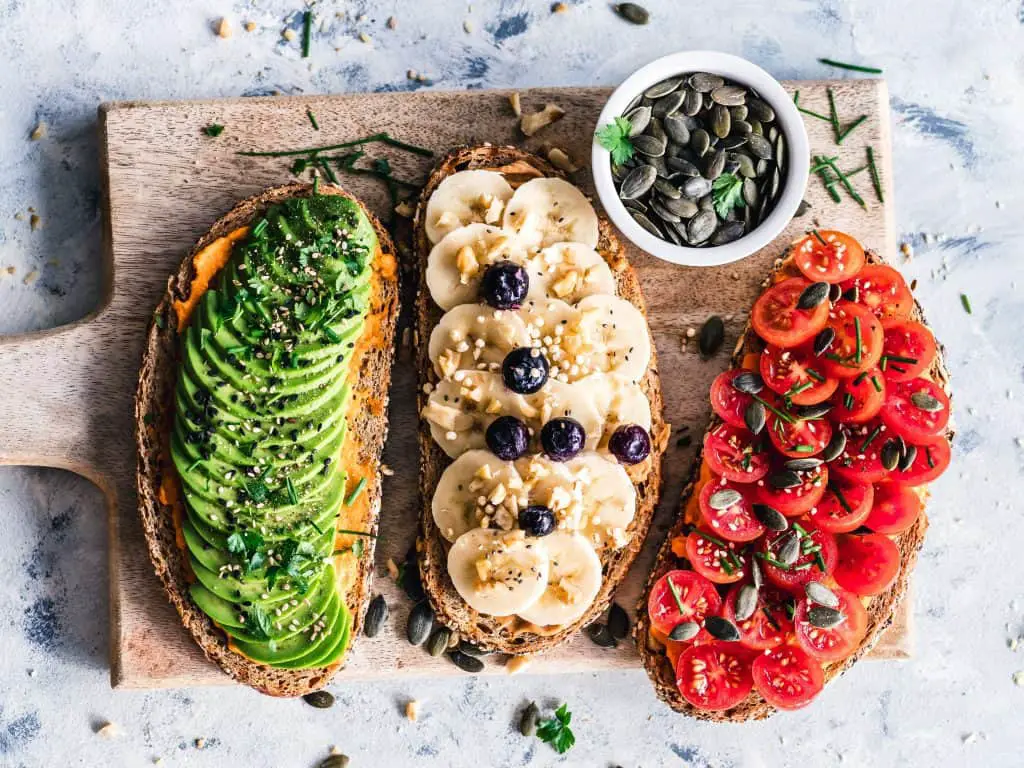
Since you’re new to this, you’re probably going to want some meal ideas. Below, we’ll give you a clear picture of what you can have for breakfast, lunch, dinner, and what could work as snacks! Be as creative as you want with the recipes, but make sure to keep an eye on the ingredients.
Week One
Welcome to your first week of the 30 day challenge! We know you may be undecided about whether you’ll proceed with the challenge, but hopefully, when you see for yourself how tasty our meal selection is and how the meals are rich in essential nutrients, you’ll stick around! But remember: resist temptations and maybe even get rid of any animal products lying around.
Sunday
- Breakfast: Half a lemon into a litre of water (lemon juice), vegan oatmeal brownies
- Lunch: Caesar salad with vegan caesar dressing (use cashews!), vegan BLT sandwich (using coconut bacon and greens like spinach, sprouts, and more)
- Dinner: Jackfruit pulled pork sandwich, coleslaw
- Snack/Dessert: Vegan fudge
Monday
- Breakfast: Banana berry smoothie, a slice of wholemeal toast, and vegemite
- Lunch: Lentil veggie burger
- Dinner: Chickpea and veggie curry
- Snack/Dessert: Dairy-free Biscoff banana bread
Tuesday
- Breakfast: Sunflower fruit salad (banana, kiwi, berries, and pawpaw), wholemeal toast with peanut butter
- Lunch: Tofu nori rolls, soy sauce
- Dinner: Spicy Thai noodles, fresh coriander
- Snack/Dessert: Vegan meringues
Wednesday
- Breakfast: Muesli and fresh fruit, 250 ml of B12 fortified soymilk
- Lunch: Falafel tabouli wrap
- Dinner: Spinach & pine nut rolls
- Snack/Dessert: Vegan chocolate popcorn
Thursday
- Breakfast: Banana & flaxseed weetbix
- Lunch: Whole grain pasta with veggie sausages, broccoli, sun-dried tomatoes, and salad
- Dinner: Chili non-Carne
- Snack/Dessert: Vegan mille feuille
Friday
- Breakfast: Vegan scrambled eggs
- Lunch: Chilli bean burritos
- Dinner: Vegan mac & cheese nachos (dairy-free, soy-free, nut-free)
- Snack/Dessert: No-butter, chocolate peanut butter cookies
Saturday
- Breakfast: Kiwi & strawberry porridge
- Lunch: Curried tofu sandwich
- Dinner: White bean pasta
- Snack/Dessert: Vegan creamsicle cake
Week Two
You made it! The first week is usually the hardest, so you’re technically halfway there by being at this stage. If you plan on eating out or travelling any time soon, remember to choose vegan-friendly restaurants. Even as you’re shopping for your weekly groceries, the ingredients label should now be your new best friend; a lot of products claiming to be vegan actually aren’t.
Sunday
- Breakfast: Cinnamon banana pancakes
- Lunch: Spinach & lentil soup, vegan sour cream, tahini
- Dinner: Meatless meat lovers pizza wrap
- Snack/Dessert: Vegan chocolate milkshake
Monday
- Breakfast: Savoury French toast with mushrooms and spinach
- Lunch: Couscous salad (Moroccan recipe)
- Dinner: Shepherd’s pie
- Snack/Dessert: S’mores pancakes
Tuesday
- Breakfast: Bagel with butter
- Lunch: Vegan cold cuts, non-dairy cheese, avocado, pickles sandwich with tomato soup
- Dinner: Seitan fillets with melted non-dairy cheese and tomato sauce, served with collard greens and mashed potatoes
- Snack/Dessert: Vegan chocolate fondue
Wednesday
- Breakfast: Pop or cog/Jamaican porridge, sprinkle with a teaspoon of raw sugar or maple syrup
- Lunch: Bean salad and rice cakes
- Dinner: Tempeh skillet casserole
- Snack/Dessert: Vegan ice cream float
Thursday
- Breakfast: Mexican hot chocolate & crumpets (using soy milk or any other plant-based kinds of milk, as long as they’re fortified with vitamin B12)
- Lunch: Tempeh salad sandwich
- Dinner: Ratatouille with polenta squares
- Snack/Dessert: Chocolate blueberry protein bites
Friday
- Breakfast: Cinnamon banana porridge
- Lunch: Vietnamese rice paper rolls
- Dinner: Mushroom & cannellini risotto
- Snack/Dessert: Carrot cake with vegan cream cheese frosting
Saturday
- Breakfast: Green smoothie and tahini toast
- Lunch: Lentil rocket salad (Mediterranean recipe)
- Dinner: Pasta bolognese
- Snack/Dessert: Gluten-free chocolate truffles
Week Three
Hats off! We’re about to call you a vegan. If you’re starting to grow bored, now’s the time to get social with the nearest vegan community around you. Being surrounded by a vegan community makes being vegan so much easier – join Facebook groups, make new friends, attend events, and even watch Youtube influencer videos for inspiration.
Sunday
- Breakfast: Strawberry, almond, and chia seed pudding
- Lunch: Pasta salad with olive oil and lemon dressing
- Dinner: Lentil patty, chips, and rainbow salad
- Snack/Dessert: Matcha green tea ice cream
Monday
- Breakfast: Turmeric latte and baked beans on toast
- Lunch: Cauliflower and leek soup
- Dinner: Tofu Frittata
- Snack/Dessert: Vegan Cadbury Creme eggs
Tuesday
- Breakfast: Mushroom & spinach tofu scramble
- Lunch: Jaffle sandwich
- Dinner: Sunday roast
- Snack/Dessert: Vegan crepe
Wednesday
- Breakfast: Apple & cinnamon overnight oats (bircher muesli)
- Lunch: Roasted veggie sandwich with basil pesto
- Dinner: Pumpkin dhal with pea rice (Indian recipe)
- Snack/Dessert: Creme brulee
Thursday
- Breakfast: Blueberry & date mug cake
- Lunch: Tempeh nori rolls
- Dinner: Cajun black bean salad and chips
- Snack/Dessert: Almond butter fudge
Friday
- Breakfast: Quinoa porridge
- Lunch: Black bean burrito
- Dinner: Sweet & sour tofu (Chinese recipe)
- Snack/Dessert: Vegan frappuccino
Saturday
- Breakfast: Rice pudding with vanilla and cloves
- Lunch: Peanut butter salad sandwich
- Dinner: Lentil bolognese
- Snack/Dessert: Sweet maple raw chia seed pudding
Week Four
You’re almost there; hang on! By now, you probably realized the importance of prepping food in advance and how it makes life a lot easier. On that note, we’d like to give you a piece of advice: keep a stock of emergency vegan snacks everywhere you can – be that your car, bag, pocket, or kitchen. You never know when you may need emergency food!
Sunday
- Breakfast: Soy yoghurt with almonds and blueberries
- Lunch: Fig and walnut salad topped with oven-roasted stuffed zucchini flowers
- Dinner: Porcini mushrooms pasta and salad
- Snack/Dessert: Vegan cake pops
Monday
- Breakfast: Avocado, agave, lime, and mint smoothie
- Lunch: Beefless stew and salad
- Dinner: Veggie hot dogs and salad
- Snack/Dessert: Vegan peanut butter cookies
Tuesday
- Breakfast: Vegan French toast with strawberries
- Lunch: Rice, bean, and avocado tostadas
- Dinner: Puttanesca pasta with summer squash
- Snack/Dessert: Vegan peppermint mocha
Wednesday
- Breakfast: Frozen or microwaved oatmeal topped with fresh blueberries
- Lunch: Whole-wheat buns with veggie hot dogs and salad
- Dinner: Soy cheese pizza and salad
- Snack/Dessert: Gluten-free chocolate cookies
Thursday
- Breakfast: Organic frozen waffles with peanut butter and banana
- Lunch: Frozen vegetable samosas
- Dinner: Frozen or microwaved brown rice with organic black beans and microwaved brussels sprouts
- Snack/Dessert: Summer sorbet
Friday
- Breakfast: Tofu-omelette on toast
- Lunch: Green bean and tomato pasta salad
- Dinner: Veggie burger with mash
- Snack/Dessert: Raw caramel squares
Saturday
- Breakfast: Banana pancakes
- Lunch: Adzuki bean burger and wedges
- Dinner: Creamy mushroom pasta
- Snack/Dessert: Lemon sugar cookies
Week Five
There isn’t a “fifth” week, but these are just days 29 and 30! You’ve basically made it! Before we wrap up the challenge, you’ve probably already gotten into the habit of cooking by now. For that reason, it’s also a good idea to take your lunch to work, school, and university. Vegan options aren’t always available, so prep ahead so that you don’t end up getting eating junk food!
Sunday
- Breakfast: Carrot bacon
- Lunch: Mexican street corn
- Dinner: Stuffed shells with tofu ricotta
- Snack/Dessert: Homemade fruit candy
Monday
- Breakfast: Vegan scrambled eggs
- Lunch: Tofu & mushroom hot pot
- Dinner: Vegan chicken fried steak
- Snack/Dessert: Raspberry vanilla cupcakes
Congratulations!
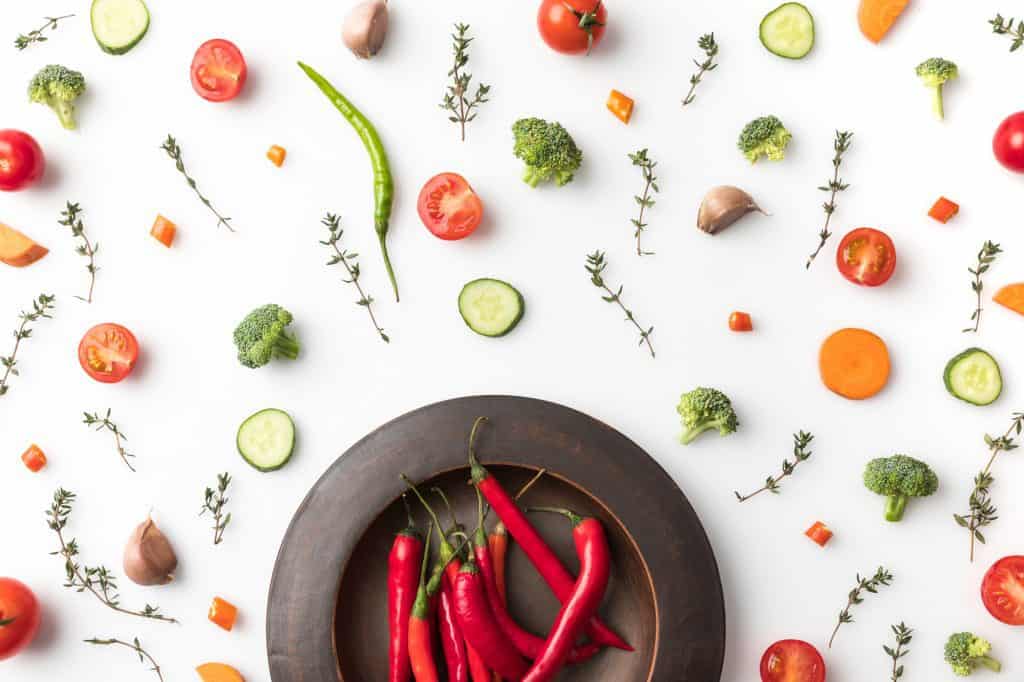
You’re a member of the vegan family now, but the choice of continuing to be or clicking reset is ultimately your choice. While we’re at it, we’d like to remind you that it’s okay to make mistakes. You probably haven’t followed the challenge by the book, and there may have been a couple of slips here and there, but that’s absolutely okay. What matters is that you kept going!
Whether you intentionally ate something that isn’t vegan, ate something thinking it was vegan but turns out it wasn’t, or even misread the ingredients, you’re totally fine. Practice makes perfect, and no one was exactly “born” vegan; we all had our mishaps but eventually found our way.
So, if you have your mind set on becoming vegan, keep going, and try to be the best vegan version of yourself that you could possibly be!
Further Read
If you’re looking for more inspiration when it comes to cooking delicious vegan dishes, feel free to check our favorite vegan cookbooks!
Frequently Asked Questions
Is Honey Vegan?
Unfortunately not. Honey is essentially an animal product, and contrary to popular belief, tons of bees are factory-farmed and have to make a habitat out of entirely abnormal conditions. For instance, queens are sometimes inseminated, have their wings clipped, and are killed in 1-2 years, despite their natural life span being nearly 5 years.
Therefore, honey is ultimately avoided by vegans and replaced by maple syrup, golden syrup, or agave nectar.
Will I Need to Take Calcium Supplements if I Don’t Eat Dairy?
It’s not always the case. For most people, green leafy vegetables, dried figs, black beans, tahini, almonds, baked beans, and similar calcium sources provide your body with sufficient calcium amounts. Not to mention, the majority of plant-based kinds of milk are fortified with calcium too.
What Can I Use Instead of Cow’s Milk?
Soy, rice and almond kinds of milk are all non-dairy examples. Other organic stores and Asian supermarkets can also provide less common non-dairy milk types, like quinoa, hemp, nut, and oat kinds of milk.
Do I Have to Eat Tofu?
Tofu isn’t everyone’s cup of tea, so no, you don’t have to eat tofu. However, as a general piece of advice, you can mix it with other elements to provide a creamy texture as well as protein. For instance, tofu is great for making sauces and replacing ricotta in pasta plates and any pastries. It’s even sometimes used as a substitute for mince.
10 Tips Moving Forward
Moving forward, you may feel a little bit lost on how to proceed or how to go about; after all, you won’t have “challenges” guiding you every step of the way. So, we’re about to give you some tips to come in handy as you make your way through the vegan lifestyle.
1. What to Eat Instead of Meat
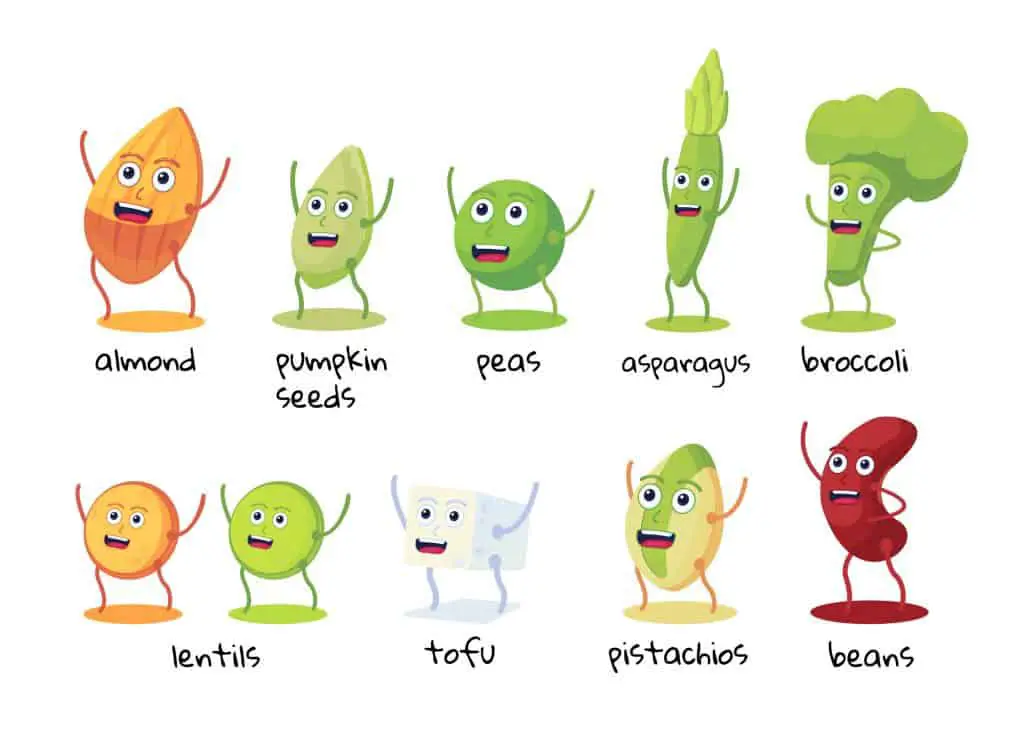
As you’ve seen throughout the challenge, it turns out that meat has plenty of alternatives! From tofu and seitan to tempeh, there are just as good options out there that make you feel equally as good and are all high in protein as well.
Plus, a lot of plant-based meat alternatives exist too. While it’s true that they shouldn’t exactly be the “staples” of your diet, they’re suitable for moderate consumption every now and then. You’ll find that most supermarkets have plant-based burgers, veggie mince, schnitzels, roasts, sausages, and more.
Tip: If there are Asian supermarkets near you, those are an excellent place to rely on for your groceries! They usually have a wide range of frozen “mock meats”.
2. Egg Replacements
If you’re a baker or simply someone who used to love eggs, you need to know all about egg replacers! Ready-made egg replacers are found in either speciality stores or major supermarkets. From biscuits and cake to making egg-free mayonnaise, these replacers taste exactly the same as eggs would.
Alternatively, banana, tofu, baking soda, vinegar, applesauce, avocado, ground chia seeds, aquafaba, and flaxseed are among the popular egg substitutes in the vegan world.
3. Limit the Junk
Vegan junk food is a discovery! That’s why it can be quite tempting to stock on it and even live off of it – been there, done that. But that’s really not a good idea; fine, do it every once in a while, but as much as you can, keep the junk to a minimum. Just like with non-vegan junk food, junk is never a good option, anyway.
4. What Does “May Contain” Mean?
You’ll come across the phrase “may contain” a lot on different products’ ingredient lists, and unfortunately, there’s no clear-cut answer to whether you should avoid those products or not. In a nutshell, the product “may contain” traces of crustacea, molluscs, fish, milk, and eggs.
While the product isn’t necessarily not vegan, it just happens to be either made on the same production line or manufactured within the same factory as non-vegan products. So, the non-vegan ingredients aren’t exactly “ingredients” of your product, but the labelling is a disclaimer in case the product got accidentally contaminated from allergens.
While that’s very genuine, also be wary of labels that say “not tested on animals”. Don’t believe those immediately; they’re not an indication that the product is vegan; some of them still have animal products despite not being tested on animals.
5. Seek Nutritional Advice From the Pros
The internet is almost accessible by everyone in the world nowadays, and anyone can say anything. When it comes to your health and nutrition, avoid taking advice from ordinary people who haven’t actually studied nutrition. Nutritionists and registered dietitians are your go-to for any concerns you may have relating to both your diet and health.
6. Eating Out: Now What?
We know that everyone loves eating out and that there’s a particular pleasure to eating ready-made food instead of having to cook for yourself every single day. But when did anyone say you can no longer do that?
Do some research to find out which restaurants and cafes in your city offer vegan food, and you’ll be surprised to find out that it’s not uncommon to find a couple! It just needs some digging and asking around, especially in vegan communities. Plus, there are resources, like this app, that help you identify vegan restaurants and products globally.
Well, what about going out for drinks? Unfortunately, tons of beverages have eggs, milk, and other animal products included in their composition. However, here’s a directory of vegan alcoholic drinks that you can safely enjoy.
What if there are absolutely no options? You can always bring your own food or even eat before going out with your circle; you never know, maybe you introduce other people to veganism? And even if not, it’s good to be sharing a meal with your loved ones and enjoying some quality time, anyway.
7. Get Creative With Spices!
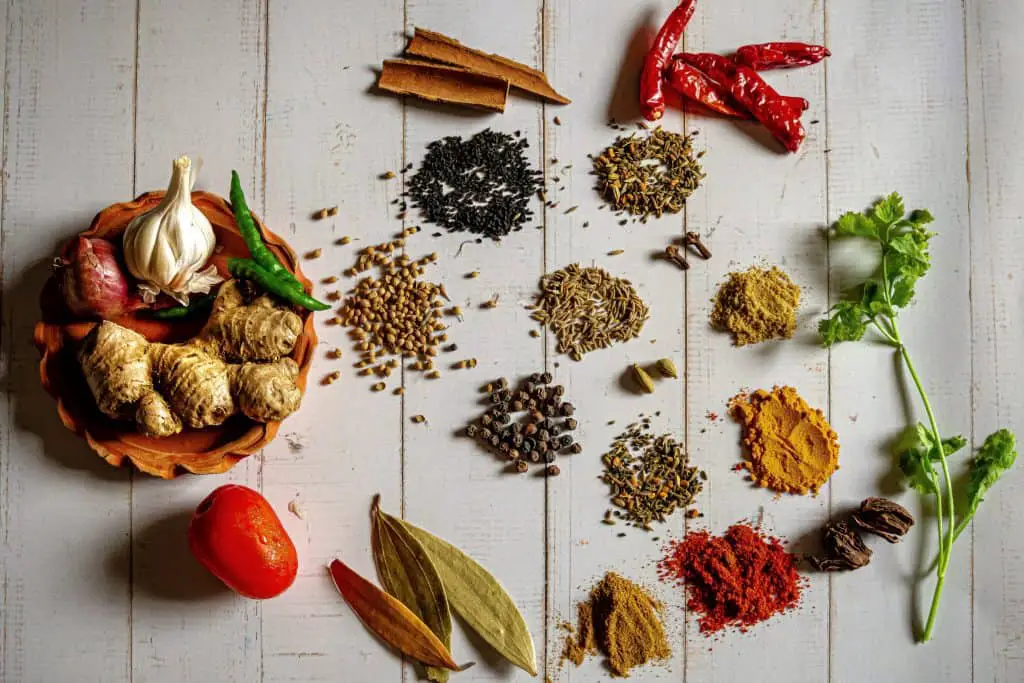
To be honest, vegan food does require some getting used to. If, at first, you feel like you’re still craving your “old” food and can’t seem to grow fond of vegan food, resort to spices. Spices can make or break your meal, so experiment with different combinations and see how they add to your food.
Salt, onion, paprika, chilli flakes, and garlic are among the spices that make all the difference in how a meal tastes. So, come up with your own spice mixes, and you’ll be well on your way!
8. Get Glutamate Without Glutamate
More often than not, you may find yourself craving “glutamate”, the ingredient that causes most foods to have that savoury, delicious taste. To get that umami taste, you need to add specific foods to your diet, like nutritional yeast (fortified with vitamin B12), toasted nuts, fermented foods, dried shiitake mushrooms, olives, and sea vegetables.
9. Join an Animal Rights Group
You’ll thank yourself (and us) later for this one. The best vegan activists are always found in animal rights groups. There, you’ll get to meet entire networks of vegan people, and you’ll learn valuable information about vegan food, health, animal rights, the environment, and more. You’ll truly feel like you’re making a difference – which you are.
10. Why Not Just Be Vegetarian?
Be prepared to get this question a lot. Have your argument ready and never grow exhausted from explaining why milk and eggs cause just as much animal suffering as meat. While we’re at it, we’d really like to stress that you shouldn’t let people’s views interfere with your beliefs or drive you away from veganism.
At the end of the day, some people won’t agree with you and always have their own points of view. So, you do you – just focus on yourself and the difference you’re making, and the rest will come naturally.
But that’s not to say that you shouldn’t speak out. You certainly should! Have active, open discussions about why you’re pursuing veganism and never shy away from your reasons and how you feel about doing so. But don’t “force” anyone into anything; make them casual conversations.
Go Vegan!
We know that going vegan isn’t a decision you can take spontaneously or suddenly; it’s understandable. However, having the benefits in front of your eyes and continuously reminding yourself of them will urge you to take the needed steps in your health journey. After all, you’re making a difference in the whole world, not just to your body.
If going vegan wasn’t the right thing to do, you wouldn’t find so many supermarkets and food outlets catering to the needs of veganism. Today, vegan food is exciting, tasty, and easy to cook (as demonstrated throughout our 30 day vegan challenge).
With just some preparation, a vegan lifestyle can be one of the easiest things to lead. Actually, we’d even say that it has never been easier to become vegan than now.
So, away with meat, and go vegan!


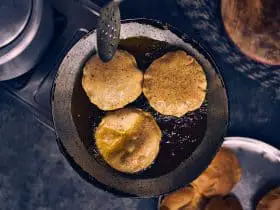

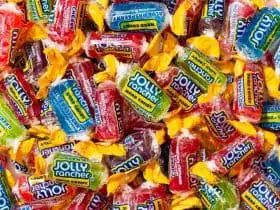
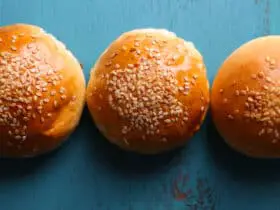

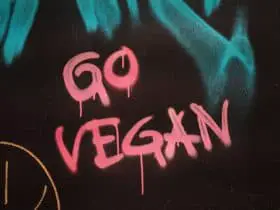
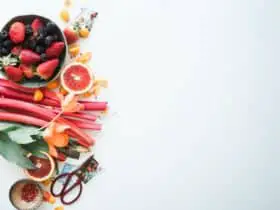

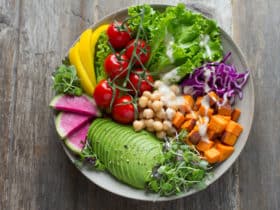
Leave a Reply